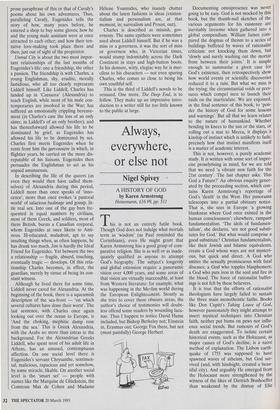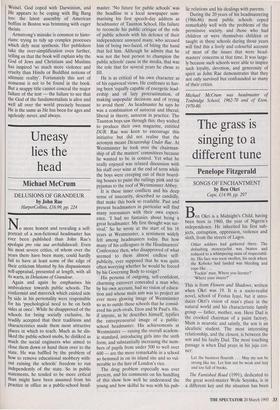Always, everywhere, or else not
Nigel Spivey
A HISTORY OF GOD by Karen Armstrong Heinemann, £16.99, pp. 511 This is not an entirely futile book. Though God does not indulge what mortals term as 'wisdom' (as Paul reminded the Corinthians), even He might grant that Karen Armstrong has a good grasp of com- parative religion. She is as well or as inade- quately qualified as anyone to attempt God's biography. The subject's longevity and global extension require a panoramic vision over 4,000 years, and some areas of that vision are virtually inaccessible, at least from Western literature: for example, what was happening in the Muslim world during the European Enlightenment. Stoutly as she tries to cover these obscure areas, the author's choice of testimonies will doubt- less offend some readers by wounding lacu- nae. Thus I happen to notice David Hume included, but Bishop Berkeley not; Einstein in, Erasmus out; George Fox there, but not (most painfully) George Herbert. Documenting omnipresence was never going to be easy. God is not mocked by this book, but the thumb-nail sketches of the various arguments for his existence are inevitably tiresome when gathered into a global compendium. William James com- pared the dogmas of theism to a series of buildings buffeted by waves of rationalist criticism: not knocking them down, but `slowly and surely washing out the mortar from between their joints.' It is simple enough to summarise a given case for God's existence, then retrospectively show how world events or scientific discoveries reduced it to a ruin. But what we miss is the trying: the circumstantial voids or pres- sures which compel men to launch their raids on the inarticulate. We are enjoined, in the final sentence of this book, to 'pon- der the history of God for some lessons and warnings'. But all that we learn relates to the nature of humankind. Whether bending its knees to the sun or the stars, or rolling out a mat to Mecca, it displays a kinship of instinct which is unlikely to fade; precisely how that instinct manifests itself is a matter of academic interest.
This is not, however, a purely academic study. It is written with some sort of impre- cise proselytising in mind, for we are told that we need 'a vibrant new faith for the 21st century'. The last chapter asks: 'Has God a Future?' An obvious enquiry gener- ated by the preceeding section, which con- tains Karen Armstrong's reportage of God's 'death' in the West. Her panorama telescopes into a partial obituary notice. That is, she sees in Europe 'a growing blankness where God once existed in the human consciousness'; elsewhere, rampant fundamentalism. 'The idols of fundamen- talism', she declares, 'are not good substi- tutes for God.' But what would comprise a good substitute? Christian fundamentalists, like their Jewish and Islamic equivalents, create a God whose ways are not mysteri- ous, but quick and direct. A God who smites the sexually promiscuous with fatal diseases; a God who topples blasphemers; a God who puts iron in the soul and fire in the blood. The force of rationalist buffet- ings is not felt by these believers.
It is true that the efforts of rationalist theologians have largely failed to sustain the three main monotheistic faiths. Books like Don Cupitt's Taking Leave of God, however passionately they might attempt to insert mystical techniques into Christian faith, neither put bums on pews nor influ- ence social trends. But rumours of God's death are exaggerated. To isolate certain historical events, such as the Holocaust, as major causes of God's decline, is a naive method of explanation. The Lisbon earth- quake of 1755 was supposed to have spawned waves of atheism, but God sur- vived (and, with hindsight, created a beau- tiful city). And arguably He emerged from the Holocaust more strengthened by the witness of the likes of Dietrich Bonhoeffer than weakened by the dismay of Elie
Weisel. God coped with Darwinism, and He appears to be coping with Big Bang too: the latest assembly of American boffins in Boston was brimming with eager theists.
Armstrong's mistake is common to histo- rians: trying to tidy up complex processes which defy neat synthesis. Her publishers take the over-simplification even further, telling us that the book will explain why the God of Jews and Christians and Muslims has inspired 'so much more violence and cruelty than Hindu or Buddhist notions of ultimate reality'. Fortunately this sort of nonsense is not to be found in the book. But a snappy title cannot conceal the major failure of the text — the failure to see that the God of the fundamentalists is alive and well all over the world precisely because He is the same as He has been for ages and agelessly: never, and always.



























































 Previous page
Previous page